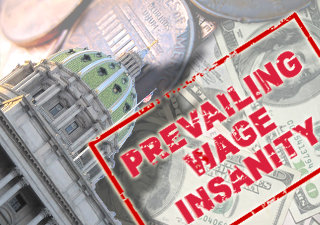Media
Six Ways Prevailing Wage Increases Taxpayers’ Costs
 This week, the Pennsylvania House is set (yet again) to consider basic reforms to Pennsylvania’s outdated prevailing wage law, which mandates that union-scale wages be paid on taxpayer-funded construction projects above $25,000.
This week, the Pennsylvania House is set (yet again) to consider basic reforms to Pennsylvania’s outdated prevailing wage law, which mandates that union-scale wages be paid on taxpayer-funded construction projects above $25,000.
We’ve noted before how the prevailing wage is on average 51 percent higher than the market wage—and for construction that is no better in quality. In 2010, Pennsylvania spent $12.7 billion on government construction projects subject to prevailing wage, such as roads, bridges and school buildings. Without prevailing wage, taxpayers could have saved between $1.3 billion and $2.5 billion. That’s an extra $400 to $900 in needless taxes for the average family of four.
Trade and construction unions often argue that prevailing wage barely raises construction costs, and doesn’t hit taxpayers hard. But across the commonwealth, township and borough supervisors and county and municipal officials beg to differ. From Butler to Bucks, officials with strained local budgets are pleading with lawmakers to reform the prevailing wage mandate. From experience, they offer proof of how prevailing wage raise taxpayers’ building costs:
- Carroll Valley Borough in Adams County reported that they had road/storm water damage in April 2011. Their engineer’s estimate to repair the damage was $45,000, with prevailing wage. Instead of using outside contractors, the borough decided to use in-house workers, thus avoiding prevailing wage requirements. The cost then? $6,958. (From the Pennsylvania State Association of Township Supervisors, PSATS).
- Franklin Township in Adams County reports that their 2008-09 Cashtown/McKnightstown sewer project was $8 million…the township contributed $1.2 million towards the project. This project serves 261 households, 26 businesses, and an elementary school. According to the township, if it did not have to comply with prevailing wage, the total cost would have been $2 million less (from PSATS).
- A proposal for a roof repair project in South Western School District in York County initially came in at $84,504, without factoring in prevailing wage rates. The contractor resubmitted his proposal for the exact same scope of work and included the payment of prevailing wages and the total cost of the project increased from $84,504 to $126,825—an increase of $42,321 or 50 percent, which was footed by local taxpayers (from the Pennsylvania School Boards Association).
When it comes to road repairs, the prevailing wage law could well be Pennsylvania’s “Pothole Mandate.” Many local governments can no longer afford to pave their roads because prevailing wage hikes costs too high. More examples from PSATS:
- Morgan Township in Greene County has not bid out a paving job since the Youngwood decision (a 2008 PA Supreme Court ruling that subjected more maintenance work to the prevailing wage law). Instead, the township has resorted to using tar and chip, sealcoating, and other pavement maintenance methods from 30 to 40 years ago to extend the life of their roads because the preferred maintenance method, paving, is no longer affordable.
- Frenchcreek Township in Venango County may return its roads to a gravel surface as they deteriorate, because the township simply cannot afford to maintain hard-surfaced roads.
- In 2009, Rose Township in Jefferson County oiled and chipped a road that is a high-traffic major route to a neighboring township and another road used as a short cut between two state highways. The township was able to oil and chip these two roads for $36,000. The township would have liked to have paved them both, but the total estimated cost, including prevailing wage, was more than the township could afford.
Our local governments are fighting to provide essential services, and giving them prevailing wage relief would allow them to do more with less. House members will vote on a bill this week that simply adjusts the prevailing wage thresholdfor inflation, from its early 1960s level of $25,000 to $185,000.
Click here to contact your lawmaker about passing the reform.